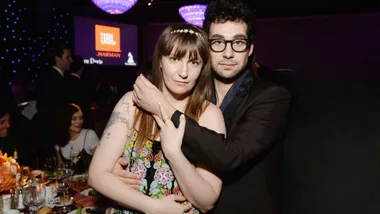It can be hard saying no to your friends, family, boss or partner, but it’s even harder taking on too much. We challenged three self-confessed people-pleasers to push back and put themselves first.
The Workplace-Pleaser
Angela Mollard took the long, hard road to get some work-life balance

It’s a great irony that the book I wrote on how to have a happy family is now my kids’ worst childhood memory. Back in 2012 I thought it was a great idea to write a memoir, and when the publisher gave me a tight deadline, I didn’t consider that working 15 hours a day telling others how to have happy children might turn out to be misery for my own. I’d rise at 5am to smash out my daily target of 2000 words before moving on to my day job as a journalist.
On weekends I’d forfeit trips to the beach for editing, and as the delivery date for the manuscript drew closer I instructed my husband to take the kids, then aged 12 and nine, away for a campervan holiday without me.
My book, The Smallest Things: Thoughts on Making a Happy Family, chronicled how to give your child a rough-and-tumble, love-filled childhood where time to build cubby houses and make homemade lemonade was all that mattered. As my kids would later recount, being shoved in front of the telly to watch The Sound of Music for the 300th time while I tapped away at my computer made them feel like the smallest things.
In the spirit of familial blame, it’s my schoolteacher mother who is responsible for my Protestant work ethic. If I’d been allowed even a single sick day during childhood, I’m sure any misplaced workplace loyalty could’ve been diverted, but instead I backed up my “always delivers to a high standard” school reports with insane levels of professional people-pleasing.
Was I a brown-noser? I prefer to think of it as a head-girl mentality (we can always spot another one in any office). I always said yes, and if asked to do something I wouldn’t go the extra mile, I’d go the extra 10. When it came to deadlines, it wasn’t in my DNA to ask for more time.
As a member of Generation X I’m confounded by the determination of younger workers to put their personal lives before their work. Because I began my career in the competitive environment of news journalism where there was a daily risk of being “scooped”, I have never put off to tomorrow what I could do today.
On the grounds I’ve never been fired, you could say this people-pleasing has served me well, even if it has displeased others who have had the temerity to point out that I occasionally – OK, regularly – mismanage my priorities.
As a young gun working in London, my best friend once phoned in distress to say she’d been mugged. Having established that she wasn’t bleeding out on the street I interrupted her tearful retelling of the incident to say I couldn’t talk right then because I needed to make an important phone call.
A colleague, overhearing the conversation, asked me if my friend was genuinely OK. I still wince at the shame. But I didn’t learn. A year later my parents had travelled from New Zealand to visit me in the UK and I’d taken a few days off from my job as features editor to gallivant with them in the tulip fields of the Netherlands.
My mum adores flowers only a sliver less than she adores me, but an unexpected change of editor back at work meant I was distracted. Would the new boss like me? What if she thought I was uncommitted because I was on holiday? I left my parents in Amsterdam and flew home early from the trip to signal my dedication to the office.
It was the wrong choice: she didn’t notice my existence for another week, and I ruined a special moment I’d never be able to recapture. It’s only in the past year I’ve reappraised my need to please. A former boss who has become a good friend told me I was widely considered to be “highly amenable”. It flicked a switch.
I was tired of being the good girl so I put boundaries in place. As a freelancer, I don’t take on a commission if it clashes with something important and I don’t agree to time-consuming work if the pay is not commensurate with the effort.
As you get older, you don’t sacrifice precious days with people you love on the altar of work. Being self-employed means I’m my own boss. It’s self-defeating to uphold the demands of the others I work for if I don’t treat myself with the same respect.
The Friendship-Pleaser
Cleo Glyde learns to push back on her nearest and dearest

Some people run for fun, others run for charity. People-pleasers? We run from icky, sticky confrontations and displeasing others. We want our personal interactions to be tickety-boo, pleasurable. Our nightmare: a text that reads “we need to talk.” Really? Watch me book a flight out of the country. I will do anything to avoid confrontation, even if I am the one who is mad.
Once, I zoned out in the hairdresser’s chair while pleasantly fizzing from a glass of champagne. By the time I looked up, the intimidating Parisian had chopped the bloody lot off. I went from cascading, turret-dweller princess hair to a butchered cut that was already frizzing into an asexual Orphan Annie bob.
Instead of flipping tables and making a fuss, l lied and said that I adored it – then marched across the street to Galeries Lafayette and bought an exorbitantly expensive wig. Oh well, at least I had bangs now.
My inability to say, “No, sorry, I can’t do that” to friends once saw me end up in harem pants on a photo shoot (note: only the singers in Boney M look good in harem pants. Irish girls can. not. do. this).
Taking on a challenge to not people-please my near and dear is particularly tricky, as I am emotionally invested. Sure, a history of sharing confidences and being there for each other conjures the warm bath of intimacy.
But in the warped brain of a people-pleaser, speaking your truth seems so squirmy that it will ruin everything, including your precious friendships.
I started small, at a dinner party. The company was great but it had been a long day; by dessert I was starting to daydream about nesting in bed with my new book. I shot to my feet and did a big stretch, a cue to jog things along. I had come in a group, and they started pouring new drinks. “Are you ready to go?” asked the visibly disappointed host.
I caught myself instinctively defaulting to politeness, then remembered my challenge. My heart skipped a beat as I announced to the table. “I just really want to go to bed now.”
They all roared with laughter at my childlike seriousness. “That’s it! Right between the eyes!” said my friend from New York – probably the most direct city on earth. We were in the car within minutes.
One of my besties, or “gay husbands”, has been planning a renovation with Excel spreadsheets and paint charts for literally years. Every time the operation is lined up, ready to go, he will sabotage it with a reason to change strategy or not go ahead, as the months tick by.
For years I have bit my tongue and humoured him, as we sit on apple crates in his gutted semi-detached. On a Whatsapp group, when he wrote, “Only nine days till eye surgery,” I took up the challenge and wrote back, “And only 40,000 nights till your reno is done.”
The next day, a little punch drunk, when one of my closest girlfriend’s finger wagged me for missing a phone date about a shared project, I let out a torrent of upset in response, wherein a year’s worth of resentment that I had been storing up about how much I had done on my own came pouring out.
It did get heated, which is surreal because I hardly ever express anger, due to my dread of hearing it. Psychological barriers are hilariously irrational, because the sky didn’t fall in – in fact, a dialogue began.
I invited my renovating friend to consider that he was in denial and paralysis, and he explained his perspective to me, which I confessed to finding bonkers. We agreed to disagree.
My girlfriend heard me out, and I felt acknowledged enough to let it go and apologise for missing the date; she also reasserted the value of her contribution so far, and we cleared it up.
Ironically, if I had gently let her in on how I was feeling all year, I would have spared her the temper tantrum. And isn’t that what I want all along – for everything to be lovely?
The Partner-Pleaser
Alley Pascoe stops jumping through imaginary hoops in her relationship

“You need to stop apologising to me,” my boyfriend says for the 27th time on our 10-day holiday to Bali. We’re walking up a steep hill in the dark after finding out the clifftop restaurant in Uluwatu I’d chosen for dinner was fully booked. I hadn’t even thought to make a reservation. I’m so sorry. I’ve ruined the night. Probably the whole holiday. Maybe even our entire relationship …
Of course, none of that is true. I’m catastrophising. My boyfriend is right, I have been apologising a lot on this – our first – holiday together. I’m sorry the shower in the beautiful ocean-view room I booked doesn’t have hot water. I’m sorry the swell was so rough on the snorkelling tour that we didn’t see any manta rays.
I’m sorry I made him wait on the side of the road for 15 minutes while I tried to get a photo of a dog that looked like it had eyebrows.
I know these things are entirely out of my control (except maybe that last one), but I still feel a responsibility to make sure everything is perfect, to keep my boyfriend happy, to give him the best holiday he’s ever had.
It’s natural to want to please your partner, but I recognise the pressure I’m putting on myself is something else.
For some, people-pleasing is a part of their personality, a result of their childhood or a trademark of their star sign (it’s me, hi, I’m the perfectionist Virgo, it’s me).
Often women are conditioned by the patriarchy to raise everyone’s spirits, to keep the energy up and to be on our best behaviour. For me, it’s all of those things and one other: a survival mechanism.
In my last relationship, I was criticised for absolutely anything and everything; the way I cut an onion, forgetting to close a cupboard in the kitchen, daring to change the radio station in his car. I walked on eggshells.
I lived in a state of hypervigilance. I shrunk myself to try to fit into the mould of a “perfect girlfriend”. Spoiler alert: it didn’t work. No matter how hard I tried or how small I became, it was never enough for my ex. He still found faults.
It took me a long time to realise I wasn’t the problem. And even now, more than two years later, I’m still trying to unlearn some of my bad habits. It helps having a loving and supportive boyfriend who doesn’t flinch when I change the radio station in his car (even when I put it on the country music station).
And so, walking up that hill in the dark away from the fully booked clifftop restaurant in Uluwatu, I decided to stop apologising for things that weren’t my fault.
After surviving the trek, we stumbled upon a local spot with a reggae band playing in the courtyard and spicy margaritas on the menu. We ended up having one of the best meals and nights of the trip. It turns out the world doesn’t end when things don’t go exactly as planned. Who knew?
Emboldened by the life lesson, I tried to tame my inner Virgo perfectionist and loosen my people-pleasing strings. I let my boyfriend worry about booking a restaurant for dinner the next night.
I didn’t apologise when I forced him to buy matching shirts with me in the local market. I took photos of all the dogs (P.S. message me if you want to see the dog with eyebrows).
On the way home, at 2am after our red-eye flight, there was a huge line for a taxi at the airport. I went to apologise, then stopped myself. Instead, I smiled, and thanked my boyfriend for a glorious holiday. “It’s the best one I’ve ever had,” he replied.










